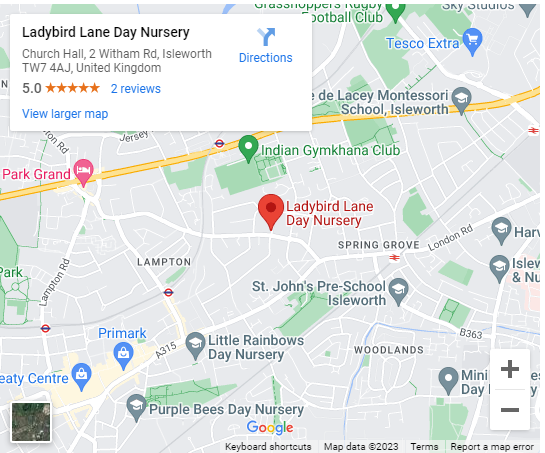
Location

Book a Tour

For Parents

Contact

Phone: 0208 232 8839
Email: office@ladybirdlanenursery.co.uk
Address: St. Vincent de Paul Church Hall, Witham Road, Osterley, Isleworth, TW7 4AJ

Learning through play
“It's different”
“It's not the same place”
“It's wet, splashy, muddy, and fun”!
(Quotes from some of the children playing outside on a rainy day)
The term ‘Forest School’ is used to describe an engaging and motivating approach to play and learning in the outdoors for children, young people and adults. Ofsted recommends that children in settings should have access to ‘out of classroom learning’ to support their understanding of the outdoor environment and to promote their physical and mental well being. At Ladybird Lane we have always understood the importance of accessing the outdoors as a means to extending the learning of the children across all areas of learning. To enhance our practice, four of our colleagues have accessed Forest School training to broaden their knowledge and understanding and this has helped to increase and improve the understanding of other colleagues, and parents, and to value how much learning can be achieved in the outdoors.
Forest school provides children with a rich experience that is fun and allows them to explore and take charge of their learning, at their own pace. It gives them the freedom to be as imaginative and creative as they want to be, whether they are making a crown to wear by using natural resources found in the garden such as daisies, birds feathers or twigs; having a delightfully messy time making mud pies; observing a nest of ants (so engrossing), or simply moving in different ways that can only be experienced in the outdoor environment including running, jumping or balancing on logs to help develop their gross motor skills. Such opportunities also help to develop their skills to become increasingly independent, to collaborate with peers in small and larger groups and to encourage them to take responsibility for their own learning by encouraging them to question, explore and experiment without fear of failure. Research suggests that natural outdoor spaces provide additional opportunities for children to develop and enhance their critical thinking, creative inquiry and problem solving techniques which are fundamental life skills.
Parents often comment on how their child’s knowledge and interest of the outdoor environment has increased since they joined Ladybird Lane; how they can name the birds they see in their gardens and in books; how, during family walks in the park they notice, and discuss, the changing colours of leaves in autumn or new leaves and blossom growing on the trees in the spring – in essence their awareness of the changing seasons! We believe children really benefit from having first hand experiences of nature, whether it’s from observing a bug under a log, listening to and recognising the bird song of the birds they have become familiar with, planting and nurturing vegetables, fruit, herbs and flowers in our growing area or building bug hotels. These opportunities help the children to develop a connection with the natural world which we hope will nurture a life-long interest and love for the outdoors that will facilitate a deep understanding of the importance of looking after our environment (i.e. our planet) for themselves, and for future generations.

 Parent Handbook (246 Kb)
Parent Handbook (246 Kb)  download
download Child Care Checklist (95 KB)
Child Care Checklist (95 KB)  Terms & Condition
Terms & Condition  Monthly Billing Chart (95 KB)
Monthly Billing Chart (95 KB)